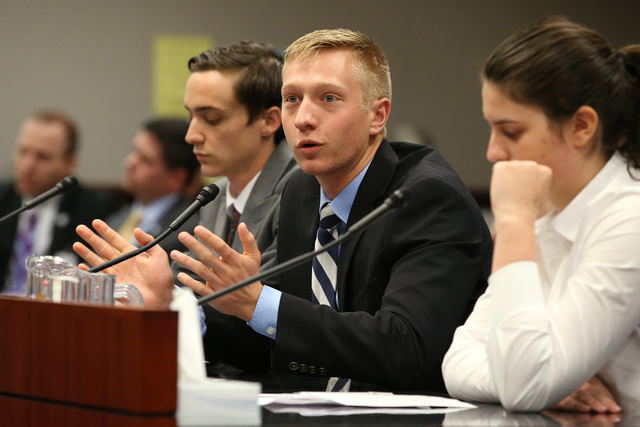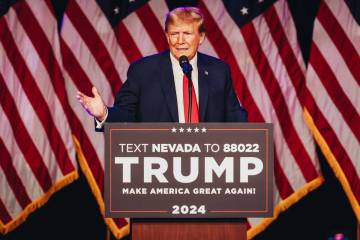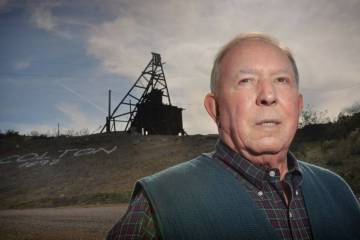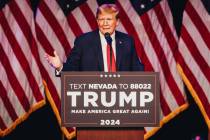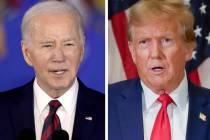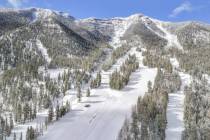Bill would exempt underage drinkers from prosecution for medical emergencies
CARSON CITY — Those underage who call for emergency medical help if they or a friend are intoxicated and need assistance would be exempt from prosecution on alcohol charges under a bill heard by an Assembly committee Wednesday.
Senate Bill 464, sponsored by the Nevada Youth Legislature, would provide medical amnesty for consumption or possession of alcohol if people under 21 ask for emergency medical assistance for themselves or someone else.
The goal is to encourage more young people to reach out for help and try to prevent premature death by alcohol poisoning.
Madeleine Welch, a Nevada Youth legislator, called the bill “a lifesaving measures that gives medical amnesty to underage drinkers in life-threatening situations.”
“Immunity is granted to the first caller and the person or persons for whom he or she is calling,” Welch said, adding that the caller must remain on the scene until authorities arrive.
The bill is also being called Brady’s Bill after Brady Caipa. The 17-year-old senior at Bishop Gorman High School died in 2011 from asphyxia and acute alcohol intoxication after attending a teen party.
“Student safety is our top concern,” Quinn Jonas, a former University of Nevada, Reno student government senator, testified Wednesday. He said the bill gives students and minors confidence “to make a potential life-saving call.”
He said the bill would alleviate fears of underage students that they could lose scholarships or other career opportunities if they are cited for the misdemeanor offense of consuming or possessing alcohol.
“In an inebriated state, where confusion and a false sense of safety takes control, young people convince themselves that a person who is ‘passed out’ isn’t drunk enough to die — that they will simply wake up the next morning with an awful hangover. Tragically, too many sons and daughters, brothers and sisters, and friends do not wake up,” Aaron Letzeiser, executive director of The Medical Amnesty Initiative, wrote in testimony supporting the bill.
Welch referenced a study by Cornell University, which implemented a campus medical amnesty program in 2002. The study showed that in the second year, the number of students seen by health center staff after an alcohol-related emergency more than doubled.
The bill passed unanimously in the Nevada Senate, but a last-minute amendment to outlaw powdered alcohol gave some Assembly committee members pause.
State Sen. James Settelmeyer, R-Minden, said the amendment prohibiting use or possession of powered alcohol was added after the federal Alcohol and Tobacco Tax and Trade Bureau approved it for sale in the United States.
“If there’s no law … there’s no wrongness,” Settelmeyer said.
Under the Nevada proposal, possession, distributing or offering powered alcohol for sale would be a misdemeanor.
Assemblywoman Olivia Diaz, D-North Las Vegas, said she was concerned that the amendment made no distinction between selling powdered alcohol and possessing it.
“I just kind of feel like when you’re young and you’re offered things, sometimes you take them and try them,” she said.
About a half-dozen states have banned powdered alcohol and dozens more are considering it.
Powdered alcohol comes in different flavors such as vodka and margaritas, which is mixed with water to make a cocktail.
Creators of the product, caled Palcohol, argue that criticism is an attempt to protect the liquid alcohol industry.
The Assembly Judiciary Committee took no action on the bill.
Contact Sandra Chereb at schereb@reviewjournal.com or 775-687-3901. Find her on Twitter: @SandraChereb

RELATED STORIES
Labor wants all public contract details revealed in Nevada
Free speech advocates oppose bill to weaken Nevada’s SLAPP law
Assembly panel hears support for gun law reform bill
Bill calls for inventory of vested water rights in dry Nevada
Clark County Commissioners, Nevada lawmakers move to reform ‘appalling’ guardianship program
Sandoval’s key tax bill clears state Senate
See all of our coverage: 2015 Nevada Legislature.



